How ‘The Inspection’ Filmmaker Elegance Bratton, Stars Gabrielle Union and Jeremy Pope Found Personal Healing Through the True-Life Tale
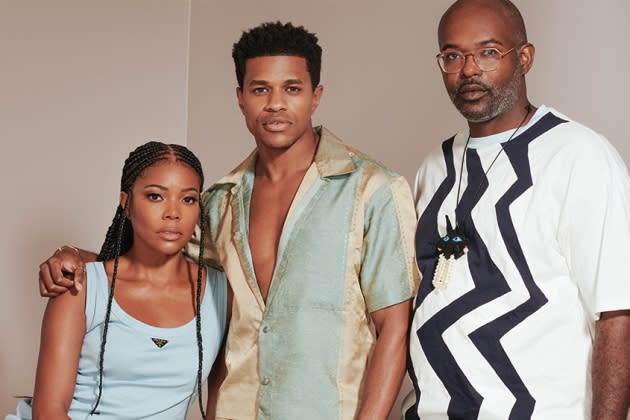
“The Inspection” writer-director Elegance Bratton is living out a prayer.
“I was in a homeless shelter on my way to joining the Marine Corps, give or take a few years. I didn’t even necessarily understand exactly what I was praying for,” Bratton tells Variety, thinking back to 20 years ago.
More from Variety
“I had gotten the job title Combat Camera, which was the first job title I ever had that sounded cool —most times it’s like, I’m the shift supervisor at whatever — so I was just praying that this could mean something more,” he continues. “I wanted it to change my life and it really did.”
While Bratton chats over Zoom, he’s preparing for his film to close the 60th New York Film Festival on Saturday night in a “homecoming” gala screening for the self-described “New York artist,” who cut his teeth working as a club photographer before directing the Independent Spirit Award-winning documentary “Pier Kids.”
“At every stage of my career growth, I’ve come back to New York and advanced to the next level,” he says on his film’s selection at NYFF. “It doesn’t get any better than this.”
But this moment isn’t exactly a fairy tale. Beyond the usual challenges for a filmmaker making their first long-form narrative feature — much less one amid a pandemic in the middle of a Mississippi summer — “The Inspection” tells the semi-autobiographical story of Bratton’s journey from a young man, homeless since 16 when his mother cast him from her home for being gay, to training for the Marine Corps under the military’s “Don’t Ask Don’t Tell” edict. Jeremy Pope stars as Ellis French, while Gabrielle Union plays Inez, characters inspired by Bratton and his mother, Inell.
“I made this movie about a young man who goes through a grueling experience just to win back his mother’s love,” Bratton says. “This is a story for anybody who’s ever felt disregarded, downtrodden and underestimated, to remind them of the power they have inside.”
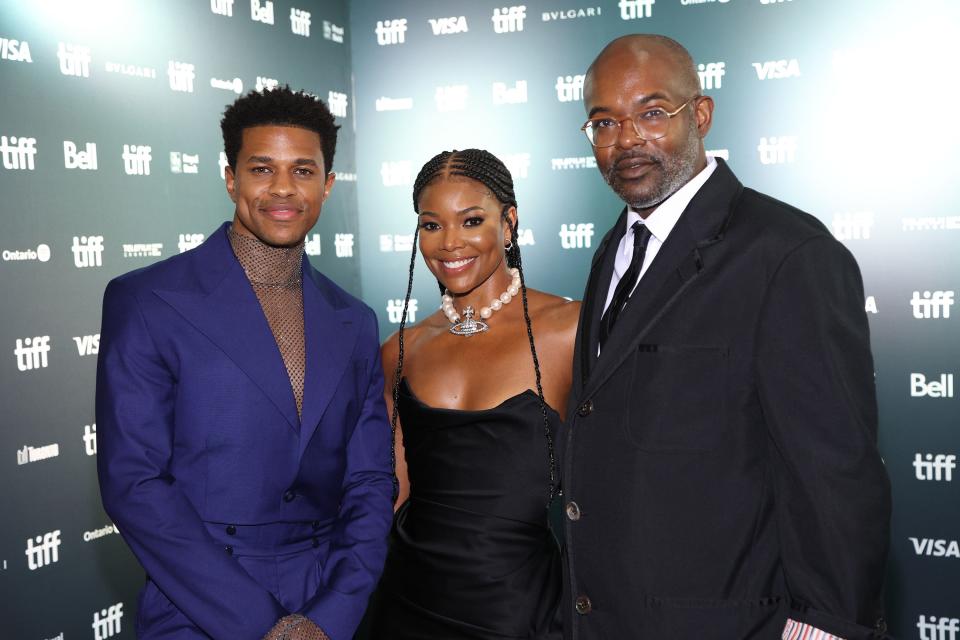
The A24 film made its world premiere last month at TIFF, where both Pope and Union earned rave reviews. Its preview screening at NYFF on Friday clocked a four-minute standing ovation.
“I made this movie as a love letter to my mom, because loving her makes everything that I went through with her easier for me to deal with,” he adds. “The forgiveness is transformational and I made this movie to memorialize that forgiveness. To see it have this kind of impact in person, I was elated. I’m overjoyed.”
But Bratton doesn’t sit through screenings anymore; he needs to pace himself emotionally for the Q&As afterward.
“Honestly, it’s just too overwhelming, in the best possible way,” Bratton explains. “It’s my story [but] it’s also a fictional story; only I really know where that line exists. So, when there’s moments where people are resonating with something that my mother has said to me, it just breaks me up when people cry, and I start crying. Then I have to get on a microphone and start talking.” I’ll
It was during a recent Q&A that Bratton revealed the status of his relationship with his mother: “We got greenlit in February of 2020; 2 days later, I found out that my mother was murdered. So, it was the happiest moment right next to the saddest moment.”
There’s not much Bratton can say about the situation: “It’s tough because my sister has yet to go on trial. It’s a horrible, horrible tragedy that I’m honestly still processing.” But he does have hope that the movie will help other people the way the experience of filming it helped him.
“I love my mom and I didn’t get a chance to find closure that I was looking for. That’s another reason why I’m so grateful to Gabrielle and Jeremy for allowing me the best cognitive behavioral therapy session you could possibly imagine,” he adds. “I got to have a moment with my mom and bring her back to life and tell her the things that I wish I could have said. I always intended to do that; I just didn’t know that it was going to happen under these circumstances.”
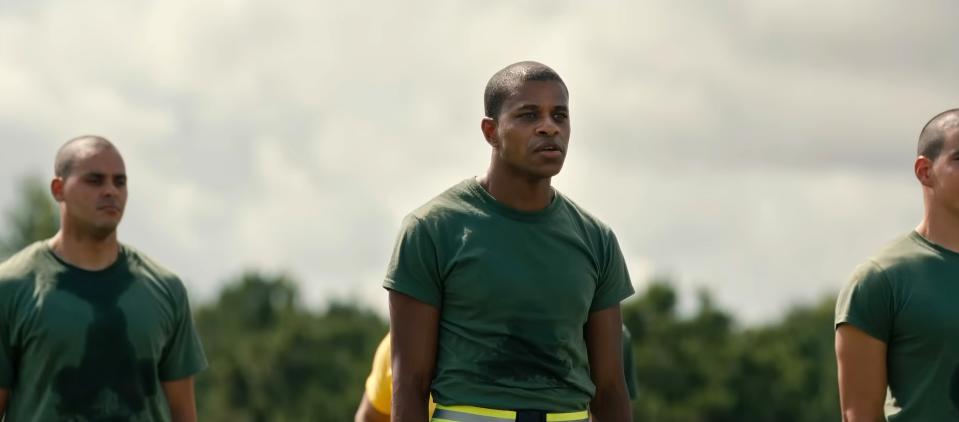
For Pope, who’d initially been drawn to the script for its conversations around masculinity (and its fragility), as well as the complex relationship between this mother and son, he found his “why” around starring in the project expanded by Bratton’s situation.
“Learning that his mother passed, it took a different toll,” Pope says, explaining that he pivoted to a supporting Bratton in the aftermath of filming. “There’s a cost for this to be your first film, to open yourself up to people in this way. I want to be the person right in front of it so you can’t get to Elegance first: you have to go through me. If I can care for another Black creative by being the vessel, telling the story in my way and pulling from my vulnerability, I can be a shield around this person who’s being extremely vulnerable.”
Union, who also serves as an executive producer on the film, describes the off-camera events and “the weight of the grief” as “the syrup that covered everything.”
The question then became, “How do you move through that as a human being, and as a mother, and as an executive producer, and also as an actress? Those are four different points of entry into this, and it was hard,” Union recalls. “The actress battled with the mother, because I just wanted to hold [Elegance] and cuddle up in a corner and give him the mothering that he deserves. The mothering that we all deserve. But that wasn’t the task. And that wasn’t the part of her life that we were excavating. It was a mindfuck.”
When Bratton initially approached Union to play Inez, she’d been hesitant, thinking it’d be tough to find common ground with the homophobic woman. As she peeled back the layers of both the character and the real Inell, though, Union recognized that same desire to feel seen and worthy that she herself has felt over the years — but approached differently.
“You realize how much you’ve sacrificed and what all you made available, whatever you put on the table in exchange for validation and opportunity,” Union explains. “Now, granted, my children have never been on the table [but] my self-respect, my sanity, my peace have always been.”
And while, she jokes, “these are great conversations for my therapist,” there’s also great value in exploring them through film.
“I want people to see themselves and say, ‘Okay maybe it doesn’t manifest in homophobia or transphobia or Islamophobia or all the others, but what have you exchanged to be seen? Bartered for visibility? Your self-respect, your identity, your peace of mind, your very being, we will gladly trade to get two steps forward.”
Despite having built a successful career spanning nearly 30 years, Union had never done anything quite like this before. The work that went into playing Inez felt like “excavating my soul,” she says, but Bratton knew she had it in her.
The filmmaker was deliberate in crafting such a personal story. For example, Bratton renamed this version of himself as “Ellis French” because he’s a lifelong Francophile, studying the language since eighth grade and living in the country for a time.
“James Baldwin is one of my favorite people and he has a long love affair history with France,” he says. “It was always a joke in my household; my mother was like, ‘What are you French or something?’”
He changed his mother’s name from Inell to Inez as a “bit of a dog whistle” to his extended family. “Our family is from North Carolina, and they call her Inez,” he says. “When you’re putting family business out, you want to make sure your family knows about it. To a lot of people, I just evaporated at the age of 16. They don’t know what Ynez did, what we went through; by naming her this way, I’m able to speak to my family and also the world. In specificity, there’s universality.”
He’d been similarly deliberate in choosing Pope and Union for the lead roles.
“Jeremy is a generational type of talent. The safe space that he created for me to be able to offer my experiences to the character that we invented out of that truth, Jeremy is someone that I will forever be grateful to, because he allowed himself to be a vessel and instrument towards this kind of emotional vision,” Bratton says. “And as far as Miss Union is concerned, she is a GOAT. She’s one of our biggest screen actresses of all time.”
It was one of the lowest moments in his life that inspired him to reach for the stars with Union.
“After I become a combat filmmaker, my mother invited me to film my little sister’s graduation,” he recalls. ”I showed up and no one in my sister or my mother’s life even knew that she had a brother. I felt completely erased. It was one of the most demoralizing experiences I’ve ever had. At that moment, a fire was lit under me to become unavoidable and it’s a huge part of why I do this art form.”
That led him to another realization about his film: “I knew that no matter how my mom felt about my sexuality, or my career, that if Miss Gabrielle Union was playing a character that was inspired by her, she would watch it and maybe it would change her.”
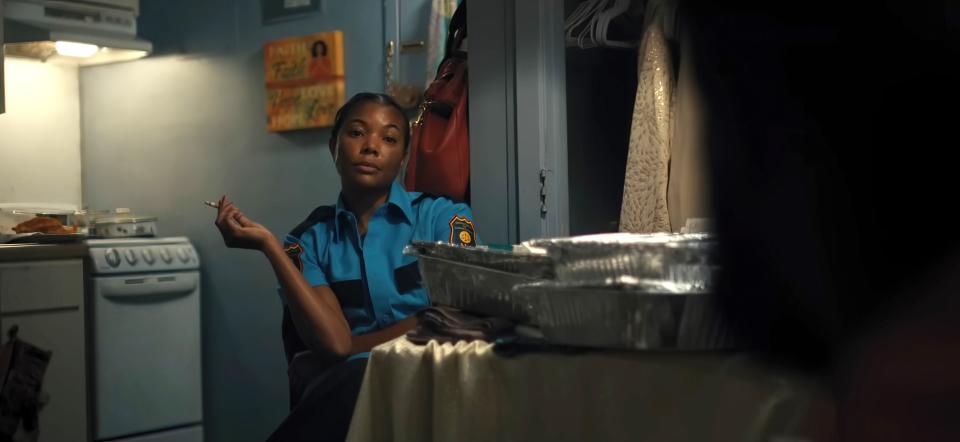
In Union, he sees shades of Charlize Theron. He sees the hyper-machinations and the wheels turning in the head of a character like Isis in “Bring It On” and has wondered why others in Hollywood haven’t recognized those qualities more often. “[Gabrielle’s] performances have suggested there’s so much more there,” he says.
Like Theron in “Monster,” Union also changed her physical appearance for “The Inspection.” “For Elegance, making a physical transformation was necessary as well so people could completely lose themselves in the story,” Union explains, emphasizing that the internal exploration was more critical for her to play the role. “For me to change myself physically but not change emotionally, mentally, spiritually would have just been cosplaying trauma.”
Among the instruments Union used to guide her performance was Inell’s Bible. “It just felt… I don’t know, heavier than a normal Bible,” Union recalls. Of course, the text itself is heavy enough that wars have been waged over its interpretation, she quips, but this copy felt particularly charged.
“When you see the writing in the margins, the notes, the dog-eared pages, where it’s been worn out at what part of the spine is most tattered, it felt like a living breathing piece of her,” Union explains. “It reminded me she had a soul before she was a mom, before she was a sexual being, before she saw behind the curtain, and to not lose sight of that and to feel a deeper spiritual connection. Not to sound like woo-woo, but I don’t have any other words to describe it other than a next-realm connection.”
In that book, you could see where Inell’s path went wrong, where it turned away from her son. “If you take certain passages quite literally, you feel justified in what you’re bartering with,” she adds. “You feel justified and encouraged in a way that makes you feel the only way to save your soul is to barter with your children, and yourself, and it was all in those pages.”
That’s the kind of deep work that this role required and it’s paid off, with Union earning some of the best reviews of her career and consideration in the best supporting actress Oscar race.
“I’m still in a bit of shock,” Union says of the reception. “The whole thing is just very, very different than anything I’ve ever been a part of, in the sense that I think I’ve been more respected as like an entertainer or someone who knows how to put, you know, asses in seats. But the respect for my actual ability has just sort of been absent a bit.”
Yet, the critical praise and acknowledgments from the industry and her peers make up just part of the equation.
“Then there’s the real people who stop you after the screening and are weeping and crying about their own experiences with their parents, it’s just heartbreaking,” she adds. “It literally can be soul-shattering hearing the levels of neglect and abuse and trauma that people have experienced and had been holding and watching this movie has given them a bit of hope, a bit of clarity, put them on the road to healing.”
She’s well-aware that part of audience’s vulnerability with her has come due to the proud way Union and husband Dwyane Wade have publicly supported their daughter Zaya, who came out as transgender in 2019. “To have that experience be paired with a piece of art has been a bit overwhelming to be honest. It’s a lot of trauma to hold as I’m fighting for my own child’s peace.”
When discussing the project with Variety at TIFF, Bratton shared how filming left him feeling “empowered” not only in his talents as a filmmaker, but also in resolving his relationship with his late mother. Speaking to that idea, Union adds, “As a mother, you want the children in your life to always be empowered and find that light. [Elegance feeling] that made me feel a lot better.”
“As an actress, you want your work to be transformative, and to be impactful. To know that through the work, Elegance saw and recognized that he had empowered himself all along, and no matter how his mother’s story ended, he was going to be okay, that was gratifying,” she explains. “At the end of the day, all of the pieces of me on that set — the actress, the executive producer, the human being and the mother — all felt like it was worth it. The darkness that I lived in and had trouble shedding could provide a whole lot of empowerment for at least one child, one family. That’s enough.”
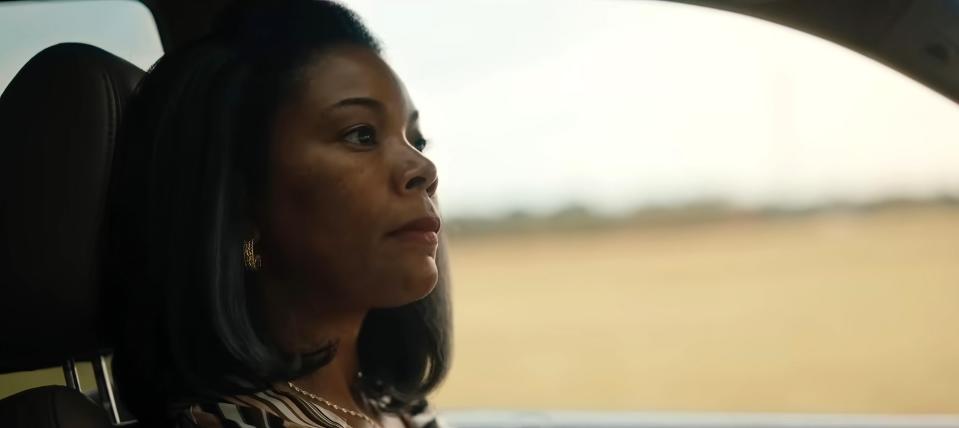
Pope had his own anxieties about the role, given that it was the Tony-, Grammy- and Emmy-nominated actor’s first lead performance in a feature. But he also immediately recognized this as unique opportunity that aligned with his personal values about the power of art to save lives.
“I can say it saved my life having these Black individuals put their stories and their hearts on the line,” Pope says. “I know it comes at a cost. I know how hard it is to get these things made, but then, when you do it, it gives you a sense of power. It gives you a sense of ownership of your truth and of your narrative. So, it only further encourages yourself and other people to just do you, to do it your way.”
Movies like “The Inspection,” are “a reminder to little Jeremy that you can be yourself,” he adds.
When Pope first moved to New York to pursue acting, he became friends with Tarell Alvin McCraney (Oscar-winning screenwriter of “Moonlight,” creator of OWN’s “David Makes Man”).
“Having him as an example of a strong Black queer individual was so important, because this business can be very tricky,” Pope explains. “Wanting to be a part of it, sometimes we do a lot of shape shifting to figure out who you think the business needs you or wants you to be. There was at one point of fear of me being an out actor and what did that mean? Would I be ‘typecast’? Right now, I feel so grateful that I chose to stand in my truth and stand in all that I am.”
That didn’t make filming the role any less “emotionally taxing” or physically intense, though. There were the practical elements — like the rigorous boot camp where Pope and his co-stars learned to march in formation or the fact that he really shaved his head on camera. “To get me down to zero with no lineup, that was rough,” he cracks.
Then, on that deeper level, serving as that “vessel” for Bratton meant allowing the role to feel “heavy” and “all-consuming,” with Pope turning inward and isolating himself a bit.
“Every hour of the day I was thinking about this story and how to unpack layers and nuance, just cracking the code, as this was so personal to him. I honestly had to free myself of anything outside of the world that we were creating. I couldn’t have too much noise,” he says. Social media especially had to go. “I had to center myself in this experience. That was challenging and it took a different toll on me than I expected.”
Despite his best efforts to steel himself for the emotional shoot, there were still moments that hit Pope’s core, like walking into the set for Inez’s home, which used childhood photos of the actor for authenticity.
“It’s kind of art imitating life imitating art because I’ve had my own experiences with family members kind of pushing me away and pushing me out because of how I identified, or me pursuing acting,” he explains. “It brought up a lot of those feelings and those wounds that I hadn’t healed yet — I honestly don’t know if or when they’ll heal, they’re sensitive sores. I just had to be patient with myself and ultimately know that this job was about me being of service to Elegance’s story.”
Looking back now, with a glimpse of the healing that the film has already provided for audiences, Pope is glad he pushed himself past his own limitations.
“I’m very grateful that people are receiving Elegance’s story with love, because when you are so vulnerable and open yourself up to people, once you give it away, you can’t get it back,” Pope adds. “I would imagine sharing your personal story, and having people critique it or have an opinion on it when these are your truths and things that have happened to you, can be a little scary and feel fragile at times. I’m just grateful that he’s still in a place of excitement and feeling love and support.”
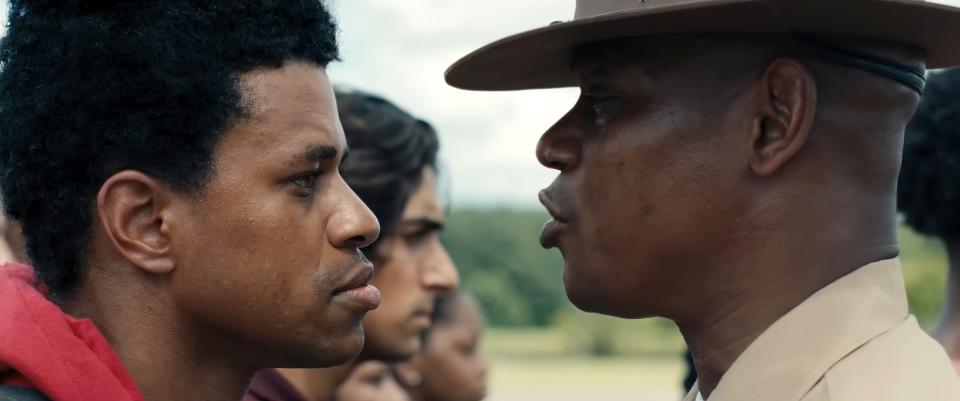
Bratton is living in that hopeful place, and a few things come with that, including opportunity with his extended family.
“My mother dealt with severe mental illness that never got diagnosed. To the world, she was just a dark-skin, loud Black lady, who had an attitude problem,” he says. “I come from a line of people where women are consistently silenced and there’s extreme issues of domestic violence. My family are now confronting this history, rather than sweeping it under the rug or just saying, ‘Oh, she’s just mean.’ We’re all starting to have deeper conversations, not only about my mom, but about each other.”
He’s also hopeful that audiences will understand that “The Inspection” is about more than being gay or Black or homeless, but about the importance of human connection.
“When I was homeless, people told me I was worthless. I believed them. I believed that because I was gay. I had no place in the world and no future,” he says. “One out of two Black gay men will be HIV positive in our lifetime. Black gay boys are eight times more likely to commit suicide than their counterparts. I wanted to make a movie to remind them we need you out here and that you can triumph over your struggles.”
It’s taking the lessons he learned in the Marine Corps — “To focus on the fact that you matter to the person to your right and to your left, that my value wasn’t about my sexuality or my race, it was about my ability to protect other people” — and applying them everywhere.
And then there’s the matter of his late mother. The two weren’t in contact when she died and their final conversation inspires the film’s closing scene. But their story wasn’t over.
“When I went to go to deal with her affairs, I saw all my articles. She printed them out from the internet and I didn’t know that was happening,” Bratton says. “I thought she was in a place of erasing me. I didn’t know that she was actually proud of me until then.”
He continues: “I wanted to make a movie that honored her memory. My mother is the first person to ever love me fully; she’s also the first person to ever reject me. My relationship with my mother is complicated. My relationship with the Marine Corps is complicated. But I do believe that she was proud of me. I’m touched by that, and I ultimately, forgive her.”
“The Inspection” hits theaters on Nov. 18.
Best of Variety
'House of the Dragon': Every Character and What You Need to Know About the 'Game of Thrones' Prequel
25 Groundbreaking Female Directors: From Alice Guy to Chloé Zhao
Sign up for Variety’s Newsletter. For the latest news, follow us on Facebook, Twitter, and Instagram.


